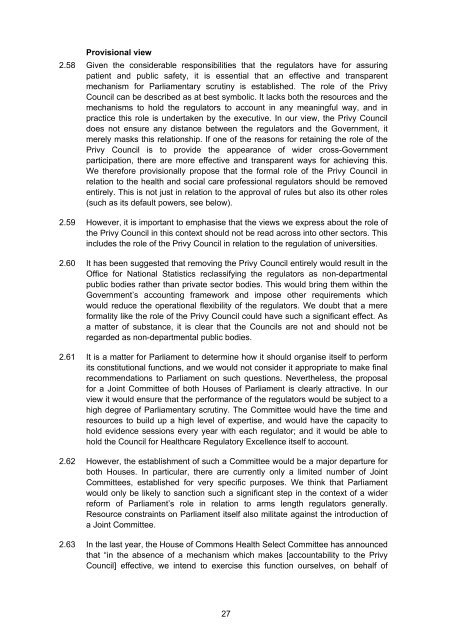Regulation of Health and Social Care Professionals Consultation
Regulation of Health and Social Care Professionals Consultation
Regulation of Health and Social Care Professionals Consultation
You also want an ePaper? Increase the reach of your titles
YUMPU automatically turns print PDFs into web optimized ePapers that Google loves.
Provisional view<br />
2.58 Given the considerable responsibilities that the regulators have for assuring<br />
patient <strong>and</strong> public safety, it is essential that an effective <strong>and</strong> transparent<br />
mechanism for Parliamentary scrutiny is established. The role <strong>of</strong> the Privy<br />
Council can be described as at best symbolic. It lacks both the resources <strong>and</strong> the<br />
mechanisms to hold the regulators to account in any meaningful way, <strong>and</strong> in<br />
practice this role is undertaken by the executive. In our view, the Privy Council<br />
does not ensure any distance between the regulators <strong>and</strong> the Government, it<br />
merely masks this relationship. If one <strong>of</strong> the reasons for retaining the role <strong>of</strong> the<br />
Privy Council is to provide the appearance <strong>of</strong> wider cross-Government<br />
participation, there are more effective <strong>and</strong> transparent ways for achieving this.<br />
We therefore provisionally propose that the formal role <strong>of</strong> the Privy Council in<br />
relation to the health <strong>and</strong> social care pr<strong>of</strong>essional regulators should be removed<br />
entirely. This is not just in relation to the approval <strong>of</strong> rules but also its other roles<br />
(such as its default powers, see below).<br />
2.59 However, it is important to emphasise that the views we express about the role <strong>of</strong><br />
the Privy Council in this context should not be read across into other sectors. This<br />
includes the role <strong>of</strong> the Privy Council in relation to the regulation <strong>of</strong> universities.<br />
2.60 It has been suggested that removing the Privy Council entirely would result in the<br />
Office for National Statistics reclassifying the regulators as non-departmental<br />
public bodies rather than private sector bodies. This would bring them within the<br />
Government’s accounting framework <strong>and</strong> impose other requirements which<br />
would reduce the operational flexibility <strong>of</strong> the regulators. We doubt that a mere<br />
formality like the role <strong>of</strong> the Privy Council could have such a significant effect. As<br />
a matter <strong>of</strong> substance, it is clear that the Councils are not <strong>and</strong> should not be<br />
regarded as non-departmental public bodies.<br />
2.61 It is a matter for Parliament to determine how it should organise itself to perform<br />
its constitutional functions, <strong>and</strong> we would not consider it appropriate to make final<br />
recommendations to Parliament on such questions. Nevertheless, the proposal<br />
for a Joint Committee <strong>of</strong> both Houses <strong>of</strong> Parliament is clearly attractive. In our<br />
view it would ensure that the performance <strong>of</strong> the regulators would be subject to a<br />
high degree <strong>of</strong> Parliamentary scrutiny. The Committee would have the time <strong>and</strong><br />
resources to build up a high level <strong>of</strong> expertise, <strong>and</strong> would have the capacity to<br />
hold evidence sessions every year with each regulator; <strong>and</strong> it would be able to<br />
hold the Council for <strong>Health</strong>care Regulatory Excellence itself to account.<br />
2.62 However, the establishment <strong>of</strong> such a Committee would be a major departure for<br />
both Houses. In particular, there are currently only a limited number <strong>of</strong> Joint<br />
Committees, established for very specific purposes. We think that Parliament<br />
would only be likely to sanction such a significant step in the context <strong>of</strong> a wider<br />
reform <strong>of</strong> Parliament’s role in relation to arms length regulators generally.<br />
Resource constraints on Parliament itself also militate against the introduction <strong>of</strong><br />
a Joint Committee.<br />
2.63 In the last year, the House <strong>of</strong> Commons <strong>Health</strong> Select Committee has announced<br />
that “in the absence <strong>of</strong> a mechanism which makes [accountability to the Privy<br />
Council] effective, we intend to exercise this function ourselves, on behalf <strong>of</strong><br />
27
















